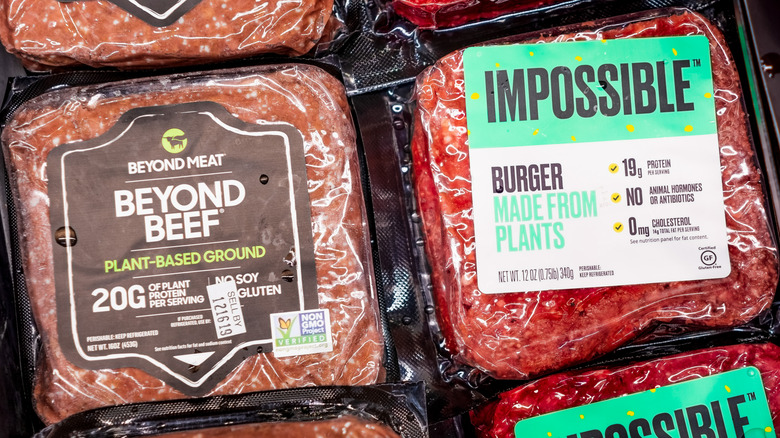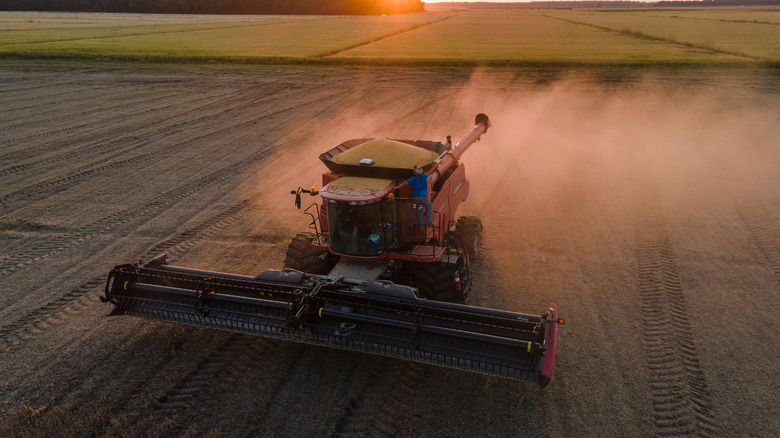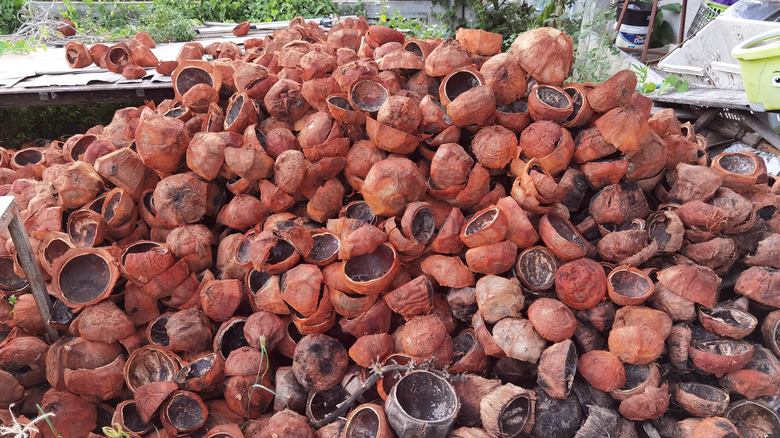The Big Problem Some Activists Have With Plant-Based Meat
Vegetarians who walk away from eating meat do so for a number of reasons. They may be unhappy with the way animals are being treated, particularly those which are raised conventionally, for example. Others may not be too keen on the flavors or the mouthfeel of meat. But there are those who are giving up meat — or at least are thinking about it — because doing so appears to represent an easy way to help clean up the environment.
And why not? The United Nations' Food and Agriculture Organization says an estimated 9% of global greenhouse gases come from raising animals for the beef and dairy industries. In the United States, the Environmental Protection Agency says that figure is 4% (via Eating Well). Given that the world is at an environmental tipping point, the World Resources Institute (WRI) called for a global reduction in beef consumption by at least 50% in 2019. For Americans, however, that figure is much higher, since we consume 3 ounces of beef daily, though the recommended serving is 3 ounces a week. America's love for beef is such that Princeton researcher Timothy Searchinger and part of the WRI study has said: "If everyone ate beef the way we do, we'd need another planet."
But that doesn't mean plant-based meat isn't without its drawbacks — and that's why some activists are up in arms.
Plant-based meat companies aren't as sustainable as consumers think
Given America's love for beef, it seems to be a no-brainer for companies that made plant-based meat substitutes, like Beyond Meat and Impossible Foods, to step into the breach, and nutritional studies support the switch from real meat to its plant-based counterparts. Research from the U.S. National Institutes of Health show these vegetarian meats have fiber, folate and iron, while offering up less saturated fat, when compared with ground beef. What they don't have is as much protein, zinc, vitamin B12, and some products are said to contain plenty of sodium (via WebMD).
But Beyond Meat and Impossible Foods aren't just falling short on the nutrition front. From a corporate standpoint, the firms are not delivering either, as they have not been transparent about their carbon footprint (via The New York Times). The lack of transparency has earned Beyond Meat a grade of zero for sustainability measures, while another has compared it to traditional meat processors Tyson and JBS. Thus, those who have converted to vegetarianism for the sake of the planet have been misled to believe that their efforts are helping the environment when they really aren't.
Companies fail to recognize the environmental impact of individual ingredients
Plant-based meat producers have, in the past, commissioned studies that show how their operations use less water and land, thereby producing fewer greenhouse gases than meat growers do. As Impossible Foods' vice president for product innovation Celeste Holz-Schietinger told Eating Well, the manufacturing process that goes into making plant-based meats is more efficient than the process needed to grow livestock, which needs to be raised, processed, and brought to retail outlets to sell. But, by the same token, some analysts say the data used by said brands may not reflect the environmental impact of the products' individual ingredients, like the soybeans or coconut oil.
But Sustainalytics, which looks at companies through the lens of their social, environmental, and corporate governance efforts, questions the positive impacts these plant-based meat substitutes might actually have (via The New York Times). Roxana Dobre, who looks at consumer goods for the research firm, points out that: "The problem with plant-based products, generally speaking, is that while they may be fixing one problem, combating the fact that growing meat is very carbon intensive and emits a lot of carbon dioxide, depending on the ingredients and where they are sourced from, you could still be involved in deforestation issues. You still need the space to grow the soy that is in many of these products."
Are companies wasting resources?
Patrick Brown, founder of Impossible Foods, appears to consider granular accounting a waste of resources. When asked about the waste generated by the use of coconut oil, Brown told The New York Times, "It's such a tiny fraction of the positive impact that we're having, to be perfectly honest. We'll report it if it's necessary, but really, you're totally missing the point if you're obsessing about that kind of stuff. [It's] a ridiculous use of our resources. It will make us less impactful because we're wasting resources to satisfy an Excel jockey rather than to try to save the planet."
But environmental activists are not buying that. As the University of California, Berkley's research director of the alternative meats programs, Ricardo San Martin, told the outlet, "The dominant narrative from the plant-based industry and the venture capitalists supporting it is that these companies are better for the environment, they're better for health, they're better for this and better for that ... [But] so much of what is in these products is undisclosed."
San Martin adds: "Everybody has a supply chain, and there is a carbon footprint behind that chain." Thus, no one knows how much greenhouse gas the manufacture of fake meat generates, nor do we know "how much water they use." And until they are told, activists likely won't make the case for making the switch from real meat to its plant-based alternatives.



